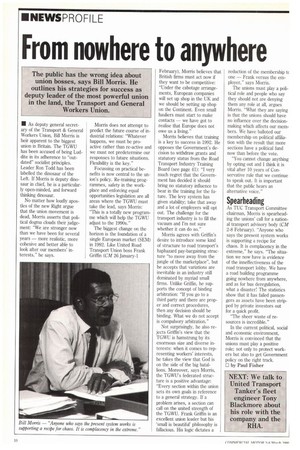From nowhere to anywhere
Page 12

If you've noticed an error in this article please click here to report it so we can fix it.
• As deputy general secretary of the Transport & General Workers Union, Bill Morris is heir apparent to the biggest union in Britain. The TGWU has been accused of being Luddite in its adherence to "outdated" socialist principles. Leader Ron Todd has been labelled the dinosaur of the Left. If Morris is deputy dinosaur in chief, he is a particularly open-minded, and forward thinking dinosaur.
No matter how loudly apostles of the new Right argue that the union movement is dead, Morris asserts that political dogma clouds their judgement: "We are stronger now than we have been for several years — more realistic, more cohesive and better able to look after our members' interests," he says. Morris does not attempt to predict the future course of industrial relations: "Whatever happens, we must be proactive rather than re-active and we must not predetermine our responses to future situations. Flexibility is the key."
Focussing on practical benefits is now central to the union's policy. Re-training programmes, safety in the workplace and enforcing equal opportunities legislation are all areas where the TGWU must take the lead, says Morris: "This is a totally new programme which will help the TGWU adjust to the 1990s."
The biggest change on the horizon is the foundation of a single European market (SEM) in 1992. Like United Road Transport Union boss Frank Griffin (CM 26 January-1
February), Morris believes that British firms must act now if they want to be competitive: "Under the cabotage arrangements, European companies will set up shop in the UK and we should be setting up shop on the Continent. Even small hauliers must start to make contacts — we have got to realise that Europe does not owe us a living."
Morris believes that training is a key to success in 1992. He opposes the Government's decision to withdraw grants and statutory status from the Road Transport Industry Training Board (see page 41): "I very much regret that the Government has decided it should bring no statutory influence to bear in the training for the future. The levy system has given stability; take that away and a lot of employers will opt out. The challenge for the transport industry is to fill the vacuum and I'm not sure whether it can do so."
Morris agrees with Griffin's desire to introduce some kind of structure to road transport's haphazard pay-bargaining structure "to move away from the jungle of the marketplace", but he accepts that variations are inevitable in an industry still dominated by myriad small firms. Unlike Griffin, he supports the concept of binding arbitration: "If you go to a third party and there are proper and correct procedures, then any decision should be binding. What we do not accept is compulsory arbitration."
Not surprisingly, he also rejects Griffin's view that the TGWU is hamstrung by its enormous size and diverse interests: when it comes to representing workers' interests, he takes the view that God is on the side of the big batallions. Moreover, says Morris, the TGWU's federated structure is a positive advantage: "Every section within the union sets its own goals in reference to a general strategy. If a problem arises, a section can call on the united strength of the TGWU. Frank Griffin is an excellent union leader but his 'small is beautiful' philosophy is fallacious. His logic dictates a reduction of the membership tc one — Frank versus the employer," says Morris.
The unions must play a political role and people who say they should not are denying them any role at all, argues Morris. "What they are saying is that the unions should have no influence over the decisionmaking which affects our members. We have balloted our membership on political affiliation with the result that more sections have a political fund now than before the vote.
"You cannot change anything by opting out and I think it is vital after 10 years of Conservative rule that we continue to speak out. It is important that the public hears an alternative voice."
Spearheading
As TUC Transport Committee chairman, Morris is spearheading the unions' call for a national transport advisory body (CM 2-8 February). "Anyone who says the present system works is supporting a recipe for chaos. It is complacency in the extreme," he says. "The situation we now have is evidence of the inneffectiveness of the road transport lobby. We have a road building programme going nowhere from anywhere, and as for bus deregulation, what a disaster! The statistics show that it has failed passengers as assets have been stripped by private investors out for a quick profit.
"The sheer waste of resources is incredible."
In the current political, social and economic environment, Morris is convinced that the unions must play a positive role; not only to protect workers but also to get Government policy on the right track. 0 by Paul Fisher




















































































































































